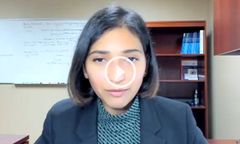
Ways to Manage Toxicities Related to Osimertinib for Lung Cancer
Mark A. Socinski, MD, discusses his approach to managing toxicities related to osimertinib for patients with non–small cell lung cancer and EGFR mutations.
Episodes in this series

Mark A. Socinski, MD, a medical oncologist and executive director (thoracic cancer) at the AdventHealth Cancer Institute, discusses his approach to managing toxicities related to osimertinib (Tagrisso) for patients with non–small cell lung cancer (NSCLC) and EGFR mutations.
The oral EGFR tyrosine kinase inhibitor osimertinib is associated with various toxicities that may need to be monitored or managed. According to Socinski, they tend to occur in the first few weeks of treatment. He says he educates patients on the importance of hydration and antidiarrheal medications to manage diarrhea.
Skin toxicities including dry skin, acne, and rash can occur. Socinski says limiting sun exposure can help, as can skin ointment such as clindamycin. He often prescribes tetracycline or minocycline as prophylaxis. Antipruritic medications may be given for skin itching. He also says that he will often involve a dermatologist for patients with a rash that is difficult to control.
Severe skin toxicity is unusual, according to Socinski, and most toxicities are manageable on a day-to-day basis. He says he had not needed to discontinue an EGFR inhibitor because of a skin toxicity.
TRANSCRIPTION:
0:08 | The toxicities tend to occur early in the first couple of weeks or so. We give patients education about how to control diarrhea, make sure they stay hydrated, use antidiarrheals aggressively. For skin, you have to be careful about sun exposure. You can use a number of local ointments, antibiotic clindamycin ointment, that sort of thing. We often put people on oral either tetracycline or minocycline for prophylaxis against that. Itching can sometimes be an issue, so we give them antipruritic medications. If the rash is difficult to control, I have a very low threshold for getting a dermatologist involved in management of the skin toxicity.
0:59 | Fortunately, severe skin toxicity is pretty unusual. It can occur, but it's pretty unusual. So most of these are manageable on a day-to-day basis. Patients figure out what works best for them. I don't think I've ever had a patient in which we had to discontinue the use of one of these drugs because of a dermatologic issue.
















































